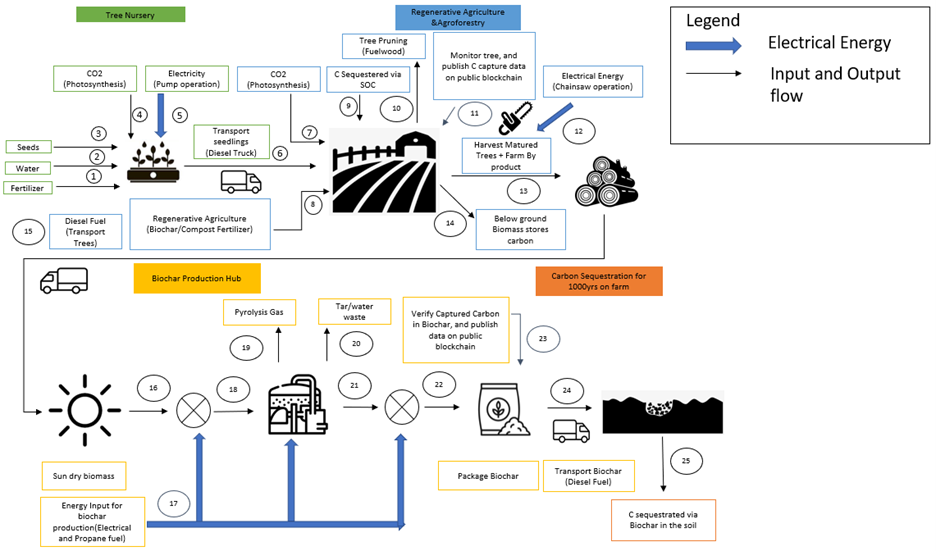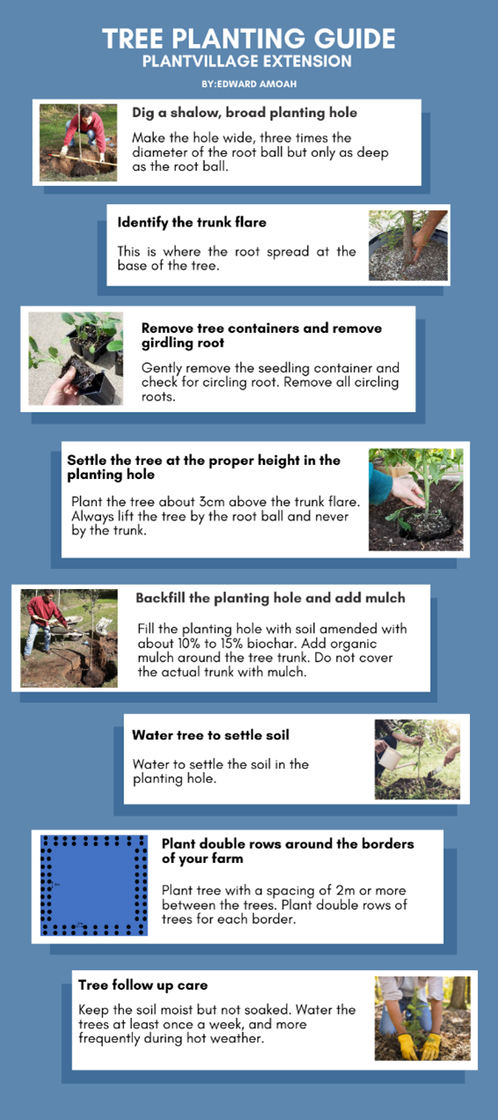Posted: April 14, 2022
Ecology graduate student and Insect Biodiversity Fellow Edward Amoah discusses the PlantVillage Carbon Capture System for agroforestry in Kenya.

Fig. 2. PlantVillage Carbon Capture System
Scientists are often faced with large scale ecological challenges that requires massive investment to study or manage the ecosystems. Large scale pest surveillance or the monitoring of bee’s health across large landscapes etc., these are all ecological challenges that require large investment to execute. In this article I will discuss a community or citizen-based model for studying and managing ecological systems that can drive global ecological changes sustainably and at scale at low cost.
In this article I will talk about the PlantVillage Carbon capture System for carbon capture through agroforestry. The USDA defines Agroforestry as the intentional integration of trees and shrubs into crop and animal farming systems to create environmental, economic, and social benefits. PlantVillage is collaborating with smallholder farmer across Kenya to practice agroforestry as a mitigation and adaptation to perhaps the biggest ecological challenge in the 21st century, climate change.
Farmers are a great resource for driving large scale ecological changes. In fact, farmers are partly responsible for most ecological issues we have today from indiscriminate use of pesticides that kill beneficial insects to the over user of chemical nutrients that pollutes our streams and water bodies. This enormous potential for farmers to affect the ecosystem can be harnessed to drive positive ecological changes. Whether it is pest surveillance for control efforts, the monitoring of the abundance of beneficial insects for restoration efforts, or the planting of trees for climate change mitigation, farmers are great resource that scientist can utilize to study and to drive ecological changes.

Fig 1. Tree Planting Guide
The Penn State PlantVillage team recognizes this enormous potential that smallholder farmers hold in Africa. Together with smallholder farmers over 120,000 trees were planted in 2021 in Busia, Bungoma, and Kilifi counties in Kenya. The PlantVillage team aims to plant over 600,000 trees in 2022. Together with the Kenyan Forestry Service the PlantVillage team has established three nurseries in Kenya. One in Busia with a capacity to produce 300,000 seedlings, one in Bungoma with the capacity to produce 180,000 seedlings and another in Kilifi with the capacity to produce 17000. This month the PlantVillage team will be training and collaborating with farmers to plant over 200,000 matured seedlings in Busia, Bungoma, and in other counties where the environmental conditions is favorable for tree planting. The figure 1 above is one of the agroforestry training resources that the team is developing to educate farmers on agroforestry practices.
The success of the PlantVillage Agroforestry project in Kenya will be replicate in Burkina Faso this year, and very soon other countries in the Sahel region in Africa, where climate change and extreme dry condition are causing severe food insecurities. In 2021, Edward Amoah, an Insect Biodiversity Center Fellow, was awarded $100,000 (i.e., XPrize Carbon Removal Student Award) to work with the PlantVillage team to develop a monitoring and evaluation system for the PlantVillage Carbon Capture project. The figure 2 (above) is a process flow diagram that shows all the stream flow of energy, and carbon in the PlantVillage Carbon Capture project. The process flow diagram shows every process or activity that is executed for the PlantVillage Carbon Capture project from tree nursery to agroforestry with farmers, to biochar production, and finally the sequestration of carbon in the soil through biochar.
The PlantVillage team is currently competing for the XPRIZE Milestone Award, where 15 $1M grants will be awarded to top fifteen carbon removal projects in the world. The XPRIZE Milestone Awards will be announced on April 22nd. If the PlantVillage team is awarded this grant the PlantVillage team will expand operations into many more counties in Africa and continue to utilize the power of small holder farmers to change the world. The success of the PlantVillage Agroforestry project can be replicated to address other large scale ecological challenges like the decline of beneficial insects. Scientist can collaborate with smallholder farmers to improve and provide beneficial insects with better habitats in the landscape.

